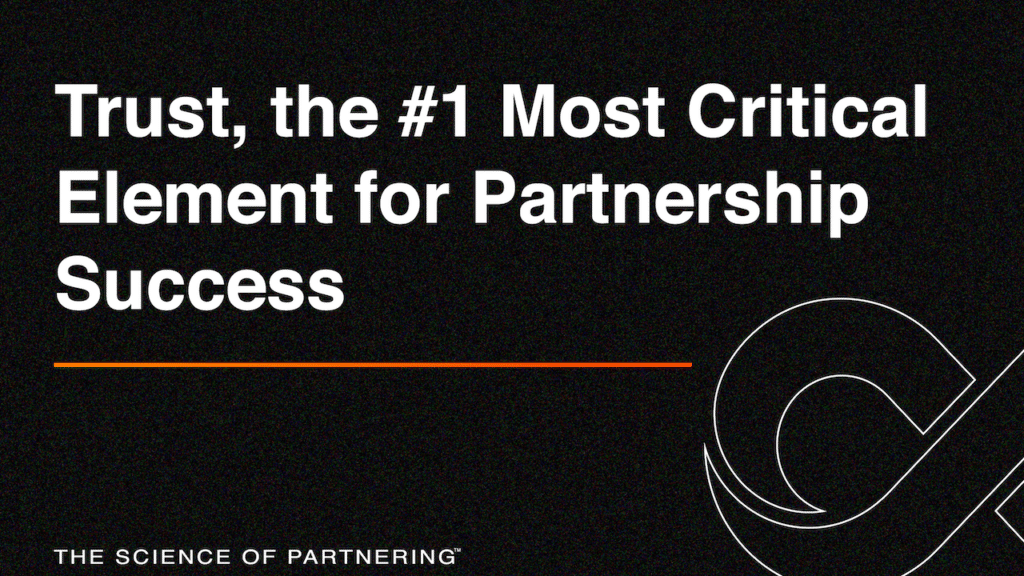Trust:
“Trust is built in drops but lost in buckets.”
~Kevin Plank, Founder of Under Armor
The first imperative for long-term partnership success is trust. Trust is the absolute foundation of all relationships; it is unequivocally the most critical element of success for your company and all strategic partnerships. Real economic gains will be realized for organizations that embody high levels of trust.
As Stephen Covey claimed in his book, The Speed of Trust, high levels of trust, both within your company and within your external partnerships, will dictate the speed of your growth. If trust levels are high, then intense validation efforts are lessened or even eliminated, and that time can be spent on activities that deliver results.
“Widespread distrust within an organization causes a tax of sorts, a cost of time and effort, a tax that high trust organizations do not have to pay.”
– Francis Fukuyama
Earning high levels of trust can be a powerful enabler. Notice I used the word “earn” as trust is truly earned and rarely freely given.
Have you ever attended a class on sales? What is the key topic of the day in all sales training classes? That’s right, how to gain trust. We have all heard the line, “People buy from those they know, like, and trust.” And this is true for partnering as well. Unlike transactional salespeople, partnering professionals are looking for a long-term relationship and it starts with building trust.
There is no doubt that trust is an economic driver. It can affect the bottom line in a hurry, both positively and negatively. If you and your organization have a strong reputation of trust, your future relationships will be accelerated. This is the power of brand and referrals. On the contrary, if you or our company has a poor reputation of trust, your future success will suffer.
Morning Consult conducts an annual survey of the most trusted global brands by polling consumers from 10 highly industrialized nations across the world. The company analyzes millions of surveys each year from more than 4,000 brands and products. According to the 2021 survey results, Google has the most trusted brand across the world. The full top 10 list includes:
- PayPal
- Microsoft
- YouTube
- Amazon
- Sony
- Adidas
- Netflix
- Visa
- Samsung
(Source: https://morningconsult.com/most-trusted-brands-2021/)
The survey results beg the question, what creates the perception of trust in a company’s brand? After all, you cannot really trust a company, can you? Just as you cannot trust your car to start tomorrow morning. After all, your car and the company that built it are not human.
Companies are led by people and these people have the potential to be trusted. Trust is built by having people see what we do and see that we deliver consistent results with integrity. Business leaders must act with the highest levels of ethics to instill trust within the organization they lead. If this occurs, trust will permeate into the brand’s reputation and into the marketplace.
Trust is the foundation and ultimate requirement for great relationships. Partner Development Leaders (PDLs), the professionals at your organization responsible for leading partnerships, must be highly proficient at establishing trusted relationships. This is true both inside of your organization as well as with prospective partners.
Dr. Paul Zak reinforced the belief that trust is a great economic engine in his book, Trust Factor. Zak’s extensive research as a neuroeconomist led to determining trust is biological, it is chemical. In numerous studies conducted around the world, he found the human brain releases oxytocin when people feel high levels of trust. Oxytocin is a powerful chemical that our brains crave.
Among other findings, Zak’s research showed high-trust organizations have greater levels of financial performance, healthier employees, higher rates of employee retention, and lower levels of stress. The positive link between trust and relationship value is undeniable. The real question is, “How do we grow levels of trust?”
It is important to understand that trust is neither static nor binary. Trust is never fixed at a particular level but rather on a continuum between zero and full. Every encounter that you have with others is an opportunity to either build or undermine levels of trust. As your company seeks to leverage the power of partnerships to grow, keep in mind that perceptions of trust for you and your company are at stake. And trust levels of both will determine the speed at which your partnership delivers results.
3 Forms of Trust
When leading strategic partnerships, there are three essential forms of trust: predictive, vulnerability, and self.
Predictive trust simply means that you complete the tasks that you say you will complete and, in general, others can predict your behavior. That is, others feel that they can count on you because you give them accurate information. If a PDL has established predictive trust, then that means he has developed a track record of predictable performance.
Vulnerability trust, as described by Patrick Lencioni in his book, The Advantage, is having the confidence that others will extend the level of grace needed for you to admit mistakes, failures, and opportunities for improvement. We have all heard the phrase, “fake it until you make it.” This is a very bad strategy in partnering. When your partners eventually determine you are “faking it,” trust will be lost and potentially forever.
Vulnerability trust occurs when you are willing to give an offer of grace when others have fallen short on a commitment. Vulnerability trust is what allows others to be authentic and transparent while communicating with you. This is the antithesis of the “fake it until you make it” approach.
When present, vulnerability trust enables great levels of loyalty and ultimately your partnership’s performance to flourish. Please do not confuse vulnerability trust with lack of accountability. When you engage in strategic partnerships, you should embark upon these journeys with best-in-class partners. Competence in their domain has already been established.
However, when engaged in highly innovative, truly strategic partnerships, things will go wrong, setbacks will occur. But in strong relationships, vulnerability trust is high, which allows counterparts to communicate openly about challenges that must be overcome. Open dialog is the best way to pool collective resources to advance the strategic initiative.
Self-trust is simply having high levels of self-confidence. This concept is completely absent from other resources that address strategic partnering, but it is a critical piece of the partnering success equation. Strategic partnerships always include innovation. Innovations are best described by “painting a word picture” of a vision for a better solution.
Self-trust is having the personal belief and conviction in the vision you have for a better future for which you are seeking support. All great PDLs have high levels of self-trust and they use this strong conviction to motivate others to join their noble cause. If you are not personally “sold” on the value of your strategic partnership, you will not be able to sell others.


